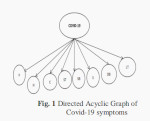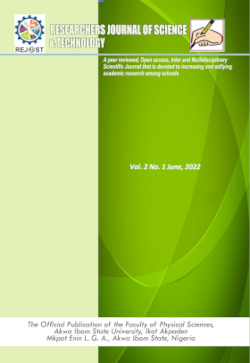Supervised Machine Learning Model For Effective Classification Of Patients With Covid-19 Symptoms Based On Bayesian Belief Network
Keywords:
Bio-inspired computing, Computer aided diagnosis, Bayesian Network, Machine learning, Covid-19Abstract
Covid-19 is a contagious infection and should
be managed properly. If it is identified early
enough, the chances of survival are high.
Symptoms presentations may be confusing to
health practitioners since they are similar to
other diseases and the number of health
professionals are mostly insufficient,
especially in developing countries, hence a
correct and timely diagnoses based on
symptoms’ presentations can prove difficult.
So far, efforts to take address these needs are
still not adequate. In this paper, we leverage on
the efficacy of machine learning algorithms to
present a machine learning approach,
Bayesian Belief Network, that aims at ensuring
that the symptoms’ set are correctly and
timeously classified as either Covid-19+ or
Covid-19- .
A dataset is gathered from observed symptoms
of confirmed Covid-19 patients by healthcare
practitioners. The dataset is trained so as to be
able to classify, based on this prior knowledge,
any supplied symptom set. This has been able to
effectively handle the problem of wrong or
delayed diagnoses with its attendant negative
consequences. Our model yields 98% accuracy,
showing a significant classification accuracy of
patients with Covid-19 symptoms.
References
Aires R., Soares A, Gomides A, Nicola A., Teixeira A, da Silva D (2022). Thromboelastometry demonstrates endogenous coagulation activation in nonsevere and severe COVID-19 patients and has applicability as a decision algorithm for intervention. PLoS ONE 17(1): e0262600.
https://doi.org/10.1371/journal. pone.0262600.
Artika Arista, (2022). Comparison Decision Tree and Logistic Regression Machine Learning Classification Algorithms to determine Covid-19. Jurnal dan Penelitian Teknik Informatika,7,(1),59-65.
Arun, Sheeba,& Dinesh, (2020). Artificial Intelligence-Based Classification of Chest X-Ray Images into Covid-19 and Other Infectious Diseases. International Journal of Biomedical Imaging. https://doi.org/10.1155/2020/8889023
Ekong A., Odikwa H., Ekong O.(2021). Minimizing Symptom-based Diagnostic Errors Using Weighted Input Variables and Fuzzy Logic Rules in Clinical Decision Support Systems. International Journal of Advanced Trends in Computer Science and Engineering, 10(3), 1567 – 1575.
https://doi.org/10.30534/ijatcse/2021/121032021
Farahat I., Sharafeldeen A., Elsharkawy, M., Soliman, A., Mahmoud, A., Ghazal M., Taher F., Bilal M., Abdel R., Aladrousy W.(2022), The Role of 3D CT Imaging in the Accurate Diagnosis of Lung Function in Coronavirus Patients. Diagnostics. https://doi.org/
3390/diagnostics12030696.
Heet S., Vruddhi M., Ramchandra M. (2020). Prediction and Diagnosis of Covid-19 using Machine Learning Algorithms. International Journal of Recent Technology and Engineering, 9(3),678-683.
Mustafa K., Syed Fasih A., Fariha I., Asma T., Rabia A., (2021). Identification of efficient Covid-19 diagnostic test through artificial neural networks approach − substantiated by modeling and simulation. Journal of Intelligent Systems. https://doi.org/10.1515/jisys-2021-0041,
–854.
Rupesh A., Amir F., Roderick D., Linda C., Gerben D., Monika H., Aly K., Habil Z.(2018). Applications of Bayesian network models in predicting types of hematological malignancies,8(1),1-2.
Saket N., Sejal M., Rocio P., Allen Z. and Ying T., (2021). Projecting Covid-19 disease severity in cancer patients using purposefully designed
machine learning, Infectious Disease, Department of Medicine, Memorial Sloan Kettering Cancer Center, New York.
Vafa B., Steven P. ,Chong L., Hemal P., Joel M., Farshid S., Payam E., Mark H. (2021). A Severe Acute Respiratory Syndrome Coronavirus 2 (SARSCoV-2): Prediction Model From Standard Laboratory Tests, Infectious Disease Society of America, DOI: 10.1093/cid/ciaa1175
Yazeed Zoabi, Noam Shomron, (2020), Covid-19 diagnosis prediction by symptoms of tested individuals: a machine learning approach,doi:

Downloads
Published
How to Cite
Issue
Section
Categories
License

This work is licensed under a Creative Commons Attribution-NonCommercial-NoDerivatives 4.0 International License.




